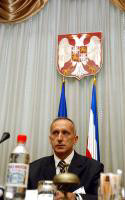- Serbia
Get to know Serbia
- Citizens
Culture and science
Health services
Pension and disability insurance
- Business
Employment
Economy
- Media
- Government
- Contact
Keep in touch
Contact form
Back
Keepin touch
Whether you have a question, comment, suggestion or any problem in the purview of the government, send us your message and we will try to respond as soon as possible. If your problem is not in our purview, we will forward your message to the relevant institution.
Q:
A:
Serbian Interior Ministry open for international cooperation in combating organised crime
Belgrade,
12 November 2004
Assistant Head of the Public Security Service of the Serbian Ministry of Interior (MUP) Srbislav Randjelovic said today that the MUP is open for cooperation on the international level in the fight against all forms of organised crime.
Speaking at a seminar entitled "A bridge towards efficient exchange of information between international criminal police", organised by the MUP and the National Central Bureau of Interpol in Belgrade, Randjelovic voiced hope that all participants in the seminar aim to offer support to each other in curbing crime.
Director of the National Central Bureau of Interpol in Belgrade Milos Oparnica said that the purpose of this seminar, which marks the final phase of a wider project "European Commission CARDS-Interpol Balkan project", is to raise awareness on the importance of the National Centre, its role and services it offers as part of the MUP.
Oparnica said that the National Centre's communication and information system will soon be offered for use to local police stations and border units, adding that the protected Internet system I-24/7 enables a daily exchange of information between 181 countries worldwide.
He specified that the information system consists of seven large databases in which Interpol member countries store data on stolen vehicles, travel IDs, persons wanted on international arrest warrants, stolen works of art, fingerprints and DNA data on criminals.
The European Commission assisted in the development of this system in the Balkan countries. The Belgrade Interpol office received around €100,000 as part of the CARDS project.
The project includes Albania, Bosnia-Herzegovina, Croatia, Macedonia and Serbia- Montenegro, and cost some €1.4 million. The project was started in 2002 and lasted 24 months. The overall aim was to build on the capacities of national central bureaus, thus increasing their efficiency.
Opening the seminar, European Commission representative David Hudson said these types of organised crimes offer the best “entrepreneurial” opportunities to criminals. The further development of Interpol's information system will help Balkan countries fight organised crime more efficiently.
Hudson said that the justice ministers of Southeastern Europe will meet with justice ministers of European Union countries in early December.
The seminar was attended by representatives of the Serbian Interior Ministry, Interpol and the European Commission.
Director of the National Central Bureau of Interpol in Belgrade Milos Oparnica said that the purpose of this seminar, which marks the final phase of a wider project "European Commission CARDS-Interpol Balkan project", is to raise awareness on the importance of the National Centre, its role and services it offers as part of the MUP.
Oparnica said that the National Centre's communication and information system will soon be offered for use to local police stations and border units, adding that the protected Internet system I-24/7 enables a daily exchange of information between 181 countries worldwide.
He specified that the information system consists of seven large databases in which Interpol member countries store data on stolen vehicles, travel IDs, persons wanted on international arrest warrants, stolen works of art, fingerprints and DNA data on criminals.
The European Commission assisted in the development of this system in the Balkan countries. The Belgrade Interpol office received around €100,000 as part of the CARDS project.
The project includes Albania, Bosnia-Herzegovina, Croatia, Macedonia and Serbia- Montenegro, and cost some €1.4 million. The project was started in 2002 and lasted 24 months. The overall aim was to build on the capacities of national central bureaus, thus increasing their efficiency.
Opening the seminar, European Commission representative David Hudson said these types of organised crimes offer the best “entrepreneurial” opportunities to criminals. The further development of Interpol's information system will help Balkan countries fight organised crime more efficiently.
Hudson said that the justice ministers of Southeastern Europe will meet with justice ministers of European Union countries in early December.
The seminar was attended by representatives of the Serbian Interior Ministry, Interpol and the European Commission.
-
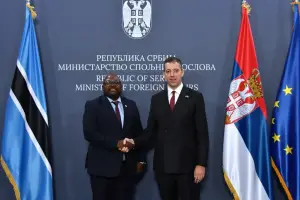 Belgrade, 21 November 2025
Belgrade, 21 November 2025Joint commitment to strengthen bilateral ties between Serbia, Botswana
-
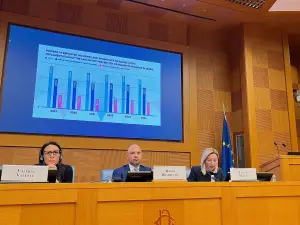 Belgrade/Rome, 21 November 2025
Belgrade/Rome, 21 November 2025Serbian government’s strong commitment to combating violence against women
-
 Belgrade, 18 November 2025
Belgrade, 18 November 2025Serbia remains committed to open dialogue, cooperation with OSCE
-
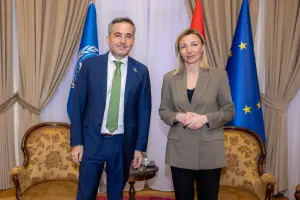 Belgrade, 18 November 2025
Belgrade, 18 November 2025Cooperation with WHO to strengthen protection for victims of violence
-
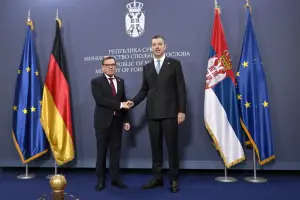 Belgrade, 18 November 2025
Belgrade, 18 November 2025Germany ready to accompany Serbia on its path towards EU
-
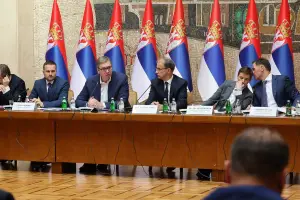 Belgrade, 16 November 2025
Belgrade, 16 November 2025Solution for NIS must be found by next week
-
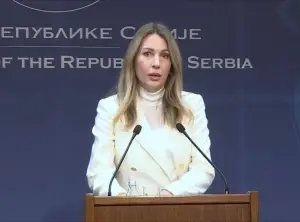 Belgrade, 15 November 2025
Belgrade, 15 November 2025United States sends request for Russian ownership to exit NIS
-
 Belgrade, 13 November 2025
Belgrade, 13 November 2025Serbia continues to be reliable partner of EU
-
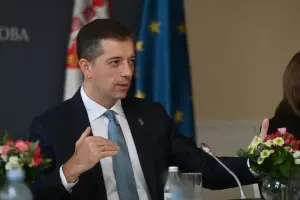 Belgrade, 13 November 2025
Belgrade, 13 November 2025European integration, preserving peace, stability priorities for Serbia
-
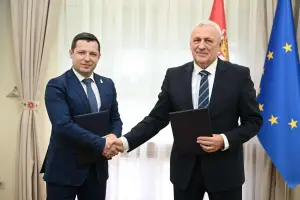 Belgrade, 13 November 2025
Belgrade, 13 November 2025Cooperation agreement signed for preparation of Specialised Expo 2027

